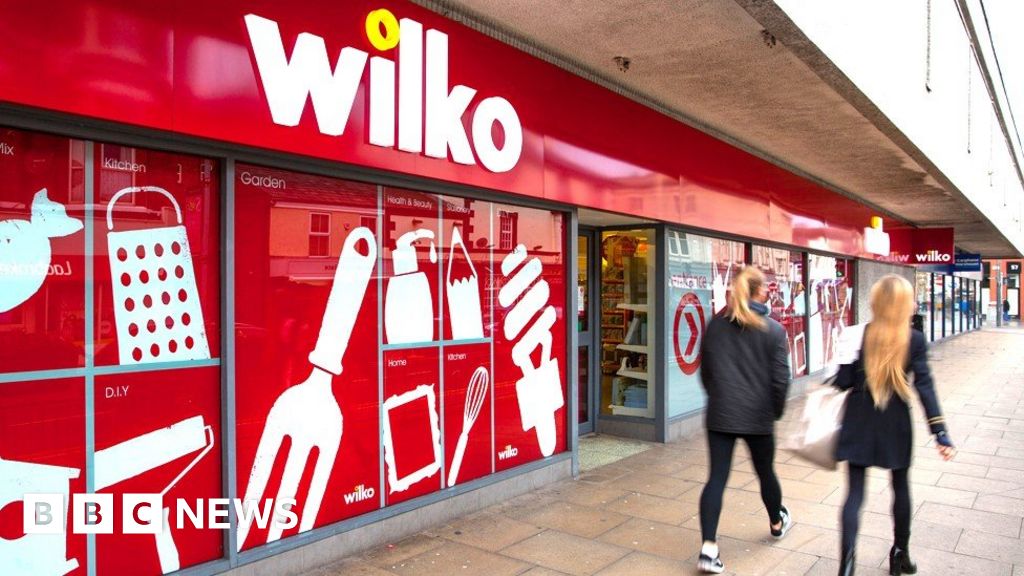Wilko, the High Street homeware retailer, has collapsed into administration, putting 12,000 jobs at risk.
The chain has been unable to find emergency investment to save its 400 shops across the UK.
Wilko had been working to find a rescuer for the business which has been trading since 1930.
The firm’s boss, Mark Jackson, said management had “left no stone unturned” in its attempts to save the company.
“But we must concede that with regret, we’ve no choice but to take the difficult decision to enter into administration,” he said.
If a firm fails to buy any of the shops or parts of the business out of administration, Wilko risks becoming the biggest High Street casualty this year.
Administrators are expected to be appointed later on Thursday. It is understood that the business will continue to trade as normal for now.
The GMB union said the collapse was “entirely avoidable”.
National officer Nadine Houghton said: “GMB has been told time and time again how warnings were made that Wilko was in a prime position to capitalise on the growing bargain retailer market, but simply failed to grasp this opportunity.”
Although the business has been struggling for some time, the depths of its problems emerged last week when it announced its intention to appoint administrators.
This gave Wilko 10 days to secure a rescue. However, it was unable to strike a deal within that timeframe.
Mr Jackson said Wilko had received a “significant level of interest” which he said included “indicative offers that we believe would meet all our financial criteria to recapitalise the business”.
But he said: “Without the surety of being able to complete the deal within the necessary time frame and given the cash position, we’ve been left with no choice but to take this unfortunate action.”
Wilko has been struggling with sharp losses and a cash shortage.
The company already borrowed £40m from Hilco, the restructuring specialist. It has previously cut jobs, changed its leadership team and sold off a distribution centre.
Many of Wilko’s stores are in High Street locations in traditional town centres, which became an expensive liability as customers shifted to bigger retail parks and out-of-town locations.
The company has also faced strong competition from rivals such as B&M and The Range as the high cost of living has pushed shoppers to seek out bargains.
Retail analyst Catherine Shuttleworth said the collapse was “sadly inevitable”, adding: “It’s a sad day for the High Street as some of the stores have been a key part of local communities for over 50 years.”
She said that Wilko had failed to adapt the retailer for the future.
“A lack of investment in systems lacking the sophistication to support a business with shops both on High Streets and out of town retail parks combined with a large estate of over 400 stores has meant that significant investments have been needed over the last 10 years and these have simply not been made,” said Ms Shuttleworth.
Richard Lim, chief executive at Retail Economics, a consultancy, said a combination of rising costs, lower customer demand and fierce competition ultimately pushed Wilko to “breaking point”.
“Against the backdrop of seismic shifts in consumer behaviour and the intense pressure on margins, the business was too slow to react to these mounting challenges and paid the ultimate price,” he said.
The company, founded in Leicester, is still owned by the Wilkinson family.
After the collapse of Woolworths in 2008, Wilko stepped up to fill the gaps left on High Streets.
Wilko began home deliveries in the 1940s, and stayed open throughout World War Two, helping residents keep their air raid shelters stocked.
On Wednesday, it announced that it had suspended home deliveries.
Devastated. After
WickesWoolworths collapsed Wilko became my go to for DIY stuff. Garden stuff, pet food and toys, all easy to grab from Wilko and IMO much better quality than it’s rivals in Amazon (fuck Amazon 😡) B&M (meh 😐) or Poundstretcher (why waste your money there?🤮).I suspect a lot more than just competition is playing into this. Currently high interest rates will be making that £40m loan sting.
Edit : I do mean Woolworths lmao
Wilko was always good for the “middle” DIY stuff. Kinda like a little, less overpriced homebase, in the middle of town.
You wouldn’t go there to rewire your house. But you would to change one socket.
Wickes is still going strong I believe. I’ve not heard anything to the contrary!
I think they mean Woolworths.
Fun story…
Plymouth’s Woolworths was the largest in the country with the largest revenue (and profit). For 5 years it had no regional manager because no one from head office wanted to trek that far. As a result it was completely ignored and not refitted or supported.
During that period head office made us all do an employee survey. One of the questions was “Do you think Woolworths will still be here in 5 years”. The store manager got shouted at because our store of 100 all said “no”.
After much consideration we were all made to redo the questionaire, this time without the question.
Just as I left a regional manager was appointed who dictated floor layout changes. Being months from finishing university I told him his changes defied how shoppers acted and would cost the store thousands. He told me I was just a shop worker and knew nothing.
A week later on daily revenue of £10k-£20k (Saturday was £100k) the store was down £50k for the week. Apparently he forced more changes and it got worse.
Everyone I talk to in retail has similar stories, all of it is terribly managed.
Yep, Wickes is still going, as is B&Q and Screwfix. Also, The Range isn’t bad as a Wilko rival.
Personally I’ve never rated Wilko. Not as cheap as B&M or The Range, but no better quality.
Yep Wickes is still alive
The article didn’t mention that the shareholders - mostly the Wilkinson family - were essentially looting the company while it was in financial trouble.
I won’t be surprised if the owners had been funnelling money out of Wilco for years.
Another case of greed impacting on the jobs of ordinary people.
Do you have a source for this?
It’s been reported in several places. For example:
“Despite its problems, owners of the chain, led by the Wilkinson family, took £3m in dividends in the 12 months to the end of February 2022.”
Thanks! This definitely puts the whole situation in a bit different light, doesn’t it.
Just reported that - yes - the family were looting Wilco for years. £77 million funnelled out of the company.
This is the best summary I could come up with:
If a firm fails to buy any of the shops or parts of the business out of administration, Wilko risks becoming the biggest High Street casualty this year.
Mr Jackson said Wilko had received a “significant level of interest” which he said included “indicative offers that we believe would meet all our financial criteria to recapitalise the business”.
The company has also faced strong competition from rivals such as B&M and The Range as the high cost of living has pushed shoppers to seek out bargains.
Richard Lim, chief executive at Retail Economics, a consultancy, said a combination of rising costs, lower customer demand and fierce competition ultimately pushed Wilko to “breaking point”.
“Against the backdrop of seismic shifts in consumer behaviour and the intense pressure on margins, the business was too slow to react to these mounting challenges and paid the ultimate price,” he said.
Wilko began home deliveries in the 1940s, and stayed open throughout World War Two, helping residents keep their air raid shelters stocked.
I’m a bot and I’m open source!
Where do you see this heading? A ton of high street shops have been closing. Are the high streets going to be dead in 10 years? Will they be replaced by other, local shops? How will it impact cities as a whole?
IMO the high street is already close to dead but the government really dont want things to change. Restaurants, franchised coffee shops, and subpar office space is what they think people want. So they will pump money into keeping Pret A Manger standing while ignoring the businesses that helped make the high street what it is.
Oh, well then I suppose it’s comforting to know it can’t really get much worse








